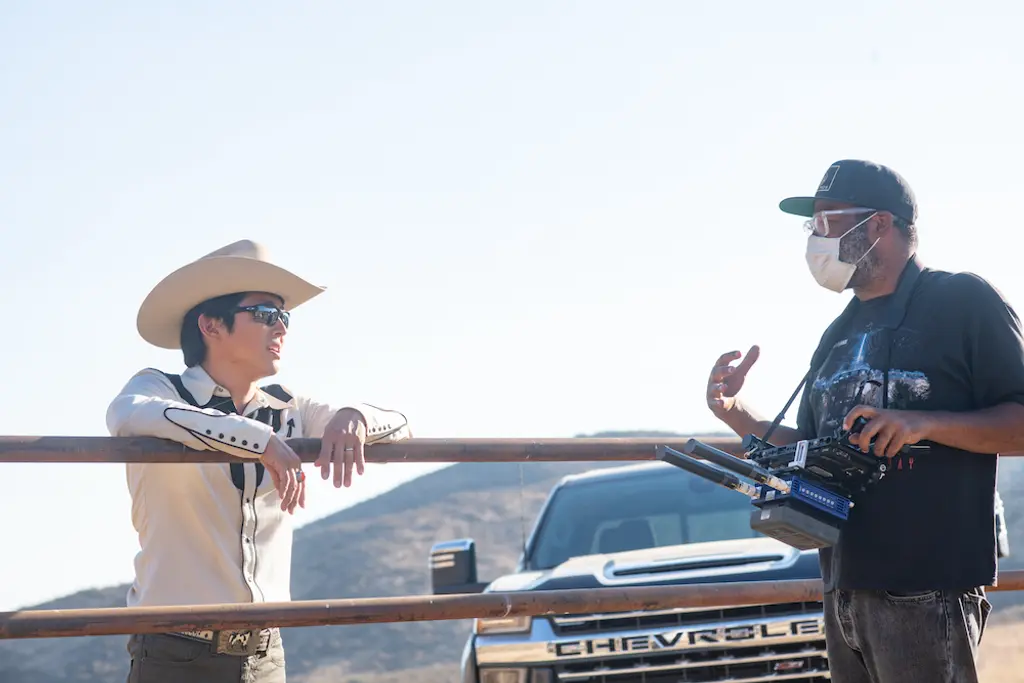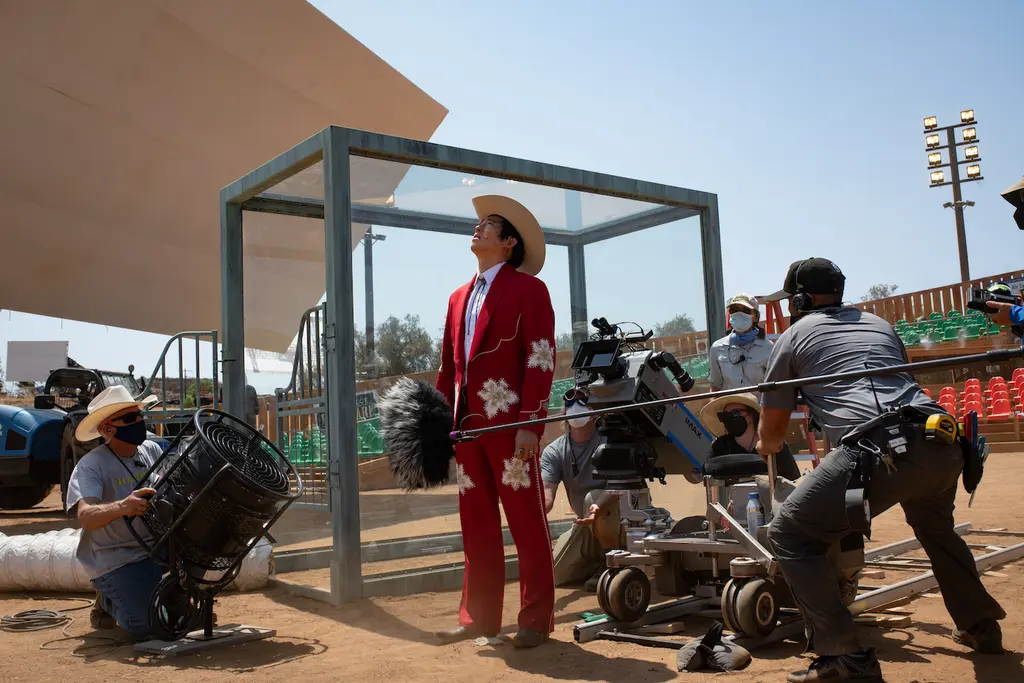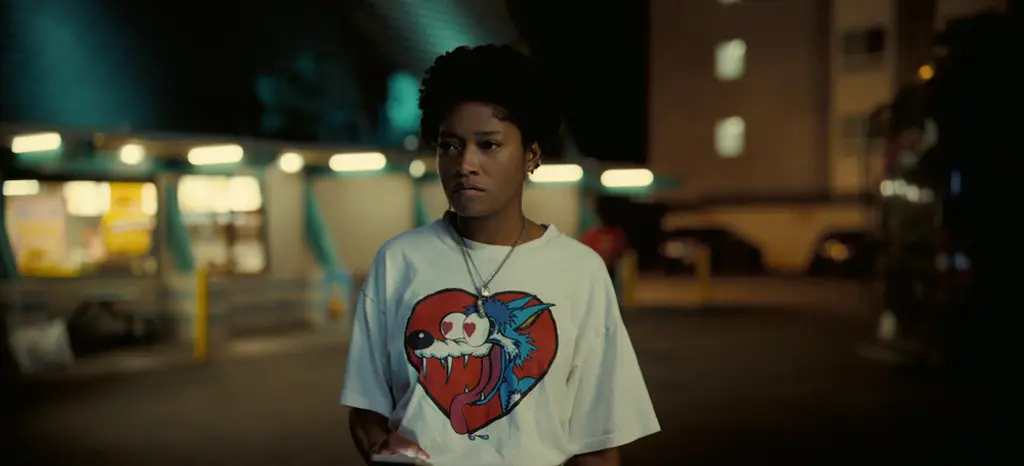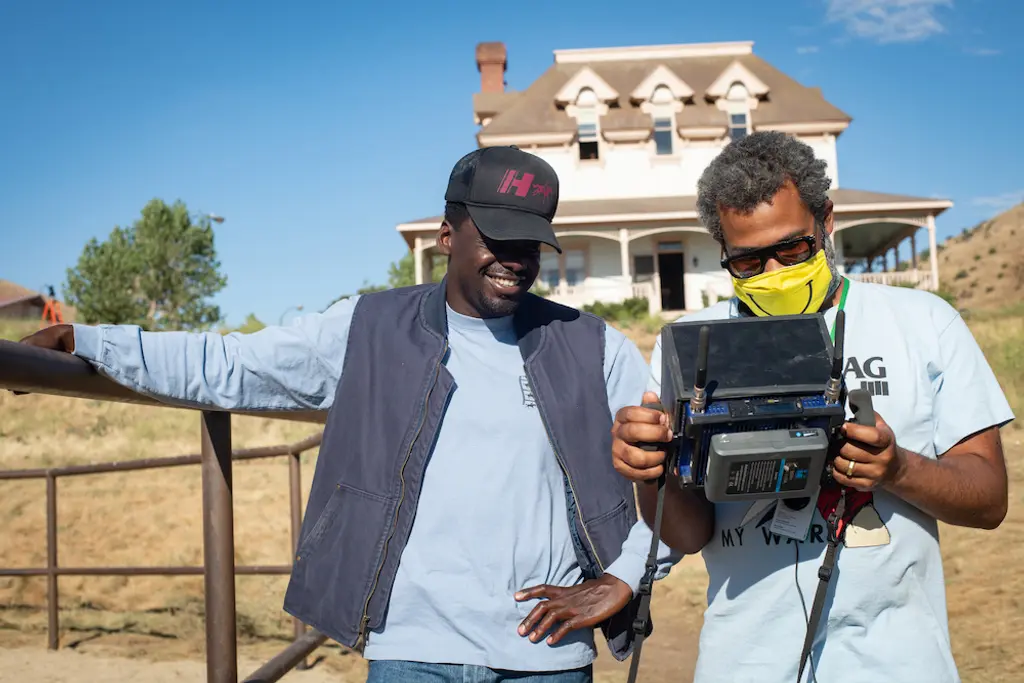Nope’s Steven Yeun on the summer’s most alien blockbuster

The third movie from Get Out and Us director Jordan Peele is a sci-fi horror that asks us to look to the skies, to Hollywood and to our own hunger for entertainment. “It feels like it’s saying a lot,” says Yeun. “And maybe everything.”
Culture
Words: Craig McLean
Does the new film from Jordan Peele invite easy description or categorisation? Nope. After the horror – literal, socio-political, allegorical – of Get Out (2017) and Us (2019), the director’s latest outing offers a mixture of spectacles via striking, darkly beautiful cinematography and narrative themes.
But even one of Nope’s stars isn’t sure how to pin down those visual delights, despite his character actually promising in one scene, “right here, you’re going to witness an absolute spectacle.”
When I ask Steven Yeun to sum up that vision, the actor exhales, laughs and (I imagine) considers his immediate surroundings as we speak on the phone, in a publicist’s office at the Los Angeles HQ of the makers of Nope, Universal Pictures. Then the Seoul-born American actor, who broke through in hit zombie series The Walking Dead and was Oscar-nominated for his lead role in A24’s Minari (2020), answers with a question: “Do you mean the meta of the film, or the film itself? There’s so many layers that we could go after!”
On a route-one level, Nope is a sci-fi movie, “classic” in its appreciative nods to previous summer blockbusters, notably Steven Spielberg’s Close Encounters of the Third Kind. Watch the skies because there’s a UFO hiding in the clouds, a flying saucer-shaped craft scaring the bejesus out of the few mortals (un)lucky enough to spot it.
In Nope, those earthly beings in Southern California’s parched Santa Clarita Valley include OJ and Emerald Haywood (played respectively by Daniel Kaluuya and Keke Palmer). They’re the sibling inheritors of the only Black-owned horse ranch serving the animal-wrangling needs of Hollywood.
Simultaneously witness to the threat from above is a neighbour also working in the entertainment industry – or, strictly speaking and crucially, working on the margins of the entertainment industry.
Ricky “Jupe” Park (Yeun) is a former child actor. Now, as a thirtysomething father-of-three, he runs Jupiter’s Claim, a slightly shonky, Wild West-themed attraction in the middle of the desert. He, like the Haywoods, can set aside his fear of the possibility of little green men and spot a commercial opportunity in the UFO.
For media fame and fortune, the Haywoods – partnering with local electronics store employee Angel (Brandon Perea) – want to capture it properly on film in an actual money shot (or, as Emerald puts it, “the Oprah shot”). Jupe is even more ambitious: he wants the craft to hove into view in the sky, in the right place and on schedule, so he can sell more entrance tickets to his rickety, dusty auditorium.
But on the other hand, this is very much not “just another” alien invasion movie. Yes, there are huge, eye-widening scenes of terror that will firmly satisfy horror and sci-fi fans’ bloodlust. But there are also questions and concepts galore, not all of which are easy to answer – nor, some viewers might feel, ultimately easy to follow.

Photography by Glen Wilson/Universal Pictures

Photography by Glen Wilson/Universal Pictures
As Peele says in Nope’s production notes: “The DNA of the movie has this big question about the human addiction to spectacle. And what happens when money becomes involved is that there’s this massive exploitation of what should be pure and what should be natural.”
As if to underscore that, Jupiter’s Claim – the location of one of Nope’s gorier scenes – is now an actual, permanent, real-world attraction on the studio tour at Universal Studios Hollywood. Pretty meta, huh?
Nope is also about representation and marginalisation. Jupe’s shooting-star kid acting career never recovered after a brutal tragedy involving a monkey on the set of the family sitcom in which he starred – a flashback sequence that features at pivotal moments in Nope.
As for the Haywoods and their family’s multi-generation legacy in Hollywood, when the siblings and one of their horses are hired to work on a film set, Emerald pointedly tells the assembled cast and crew the story of Eadweard Muybridge’s 1887 images of a Black jockey on a horse. These 16 sequential images were one of the earliest examples of chronophotography, a foundational photographic technique on the route to the invention of motion pictures. But while the name of Muybridge, the horse’s owner and even the horse are known, that of the Black jockey has been lost to history.
“This movie’s not about race per se, although race does interact with this idea of spectacle-isation and exploitation,” Peele says in the production notes. “But the movie, in itself, is meant to be a film that couldn’t be made five years ago, in that it’s an original piece of content, starring people of colour, directed by a person of colour, with a big budget and some crazy shit in it. That movie’s not supposed to be made.
“So, in the soul of the film, just by existing, we have some obligation to acknowledge all the people who haven’t been allowed to take a bow, all the people who haven’t been allowed an opportunity to succeed or fail. I think that’s what the movie is about.”
As with Get Out and Us, then, beneath the spectacle, Peele has seeded his film with conversation-starters for audiences to chew on long after they leave the cinema. Acknowledging this, and nodding to Yeun’s “meta” comment earlier, Peel told The Hollywood Reporter: “I’ve done my part and created something of a spectacle, created something of a story about how people consume spectacle, so now I’m ready to listen and kind of see how it falls. I’m very proud of it.”
As Yeun added in that story, “I hope it’ll make [audiences] think maybe why we want to be seen so much, but I get it. It’s a lot to unpack.”
Below, we have a go at doing just that with the 38-year-old, all the while gingerly picking our way past any spoilers…
So, Steven: let’s start, again, with the spectacle of Nope…
When I saw the first cut of this film, I said to Jordan: “You really did it. You just made a classic Hollywood movie that maybe we haven’t seen in a while. And done it at the scale that we will all remember.” He really accomplished that. This movie looks big, massive.
And the beauty of that is he juxtaposes that with the meta of the spectacle, the… I don’t even want to say commentary. But just the reflection of the mirror against all of us. It feels like it’s saying a lot. And maybe everything.
How would you describe your character, Ricky “Jupe” Park?
In some ways, he’s all of us. He is perhaps someone that, not just through his traumas in life, but just the way he was raised [and] the situation he came into as a young child, is [now] finding himself in his adult years.
And I think he’s trying to fill a huge hole in his heart, like a lot of us. There’s a lot of layers to him. I guess I’m trying to say this without giving anything away about him! But he’s maybe the sum of a lot of other people’s expectations of him.
How was the audition process?
I was lucky enough that it was just offered to me. But we never got too much into the weeds [of what Jordan saw in me for the role]. We went straight into who this person is. If anything, I can relate a little bit. I feel like I touched a lot of [Ricky’s experiences in my professional life]. I did this show a long time ago called The Walking Dead. I was pretty young. I wasn’t as young as this character was, but I was pretty young – 25 at the time.
To come into that type of explosion of a show was something I could easily relate to. Something that takes you on a ride that you don’t have full control of. So we talked about that.
What did you like about Jordan’s previous films?
The fact that he was speaking a language that we all knew, but speaking it [with] a slightly different gaze, from a slightly different angle. In doing that, he made it brand new. I always liked what he was doing because he was touching a new neoclassicism in a way. I always appreciated that about his work.
Daniel had obviously worked with Jordan previously. Did you get any insight from him about what he was like to work with as a director?
No. And I don’t know if I [would] necessarily ask those questions. But it was great to connect with Daniel. When you’re in the hands of a really wonderful person like Jordan – and also he’s accruing the cast he’s accruing; great people, like Daniel and Keke and Brandon – you know you’re assembling a great vibe on set. Those are the experiences I really gravitate towards.

In Get Out and Us, Jordan insightfully skewed, inverted and/or reframed questions of race, tolerance and inclusion in America. There are elements of that in this movie as well. How important was that to you, that there were those deeper, more sociopolitical and contemporary resonances in this film?
You know, I’m not necessarily one to stand on a soapbox. For me, the literal way in which sometimes we end up talking about these very important themes and concepts and ideas, I don’t know if that’s how I try to accomplish them.
What I love about Jordan is that it’s not necessarily that he’s putting all his focus on those things. It’s more that he’s taking off a layer within the genre of the metaphor itself. We don’t need to hide it in an actual ghost, or a demon, or a monster. It can be a little bit closer to us. Because that’s what the [metaphor] was trying to say anyway.
I don’t think you can ignore those types of social commentary in any of the genre pieces that we’re really talking about. It’s just that he’s just speaking from a specific lens. So it seems to be on the surface, but really it’s what it always is: a mirror.
To speak about Minari, your Oscar nomination and its broader success, how personally gratifying was it for you that a film centred on Korean culture, Korean representation and the Korean experience in the US was so warmly received and so widely loved?
It’s always great when the seeming barriers of culture don’t get in the way of people being able to access them, even when they’re outside of that culture. But when we were making that film, the key was not necessarily that we were trying to proselytise our culture.
We were just trying to tell a true rendering of that culture itself. Not for the sake of it being put out there, but really so that anyone – whether they’re within the culture or outside of the culture – can come in and access our story as a human story, as a family.
Then, to discuss another aspect of Korean culture, Squid Game just made history as the first non-English language series to receive an Emmy nomination. Do you think, “about time”, but then also, that this is a huge and positive step forward?
It’s a positive step forward in the global nature of where we’re headed. Hopefully we’re able to see each other beyond nation state lines. And see that we all have human stories everywhere, and how we can relate to each other, even if we have language barriers and cultural barriers.
[But] I’d say sometimes it can get strange when what’s happening in Korea gets conflated with what’s happening in [East] Asian America. Those aren’t necessarily the same. But I could very well see how those two get confused. So, yeah, we’re in an interesting time where we’re able to have Asian American stories and have Asian mainland stories that land in America.


You’re about to reunite with Bong Joon-Ho, Oscar-winning director of Parasite (2019), with whom you made Okja (2017) – the best satirical, dystopian, militant vegetarian animal fable about a super pig ever. Your new project together is Mickey7, a sci-fi adaptation also starring Robert Pattinson and Naomi Ackie. What can you tell us about that?
I can’t tell you much! But that will start probably in the fall. And it’s so cool to work with director Bong anyhow. It’s gonna be really cool, hav[ing] worked with him before, to have a little shorthand and understanding. I’m so excited. It’s gonna be so much fun.
You’ve also just finished filming Netflix series Beef, in which you’re one half of a couple involved in a road rage incident. Can you tell us anything more about that?
We just finished the [first] season a couple months ago. It’s in post[-production] now. And… oof… we had a great time, [but] it wasn’t easy, a lot of emotions. I mean, there’s not much to say I guess beyond what it is. But we’re really trying to speak from a human place. And that’s what gets me really excited about that show.
Is “dramedy” a fair description of that show?
Yeah… I mean, I also love that we’re in this weird age where no one’s sure what to call anything anymore. I don’t know what it’s like for you, but I’m agonising [over it] because nothing feels like it has a definition. But maybe genre is just merging. Maybe the western convention of separating these concepts is starting to dissipate. Maybe that’s a good thing.
One show that was, and still is, pure drama is The Walking Dead, the long-running zombie drama which finally ends this autumn. There were many traumatic scenes across your 66 episodes. But I’m sincerely not blowing smoke up your arse when I say that the season seven death of your character Glenn [spoiler alert: bludgeoned to death with a barbed wire-covered baseball bat called Lucille] was probably the most traumatic thing in the entire run of the show (so far) for me.
Oh, man! It felt like it [on set,] too. But shooting it honestly wasn’t that traumatic. It was difficult in the sense that I was saying goodbye to my friends. There was also [the challenge of] simulating the reality of that moment, which was really gnarly. But knowing that we were honouring something in the comic book, too, meant I wanted to make sure that it was done well. But I have no negative feelings towards that moment.
That scene, that sequence, was crazy. And the timing was also crazy – 2016 was a very gnarly year. A lot happened! So it feels like a touch point in reality, sometimes, to me.
Just to circle back and end on back on Nope, let’s have another go at description, but again without giving too much away. What metaphorical function does the threat from the skies perform in this film?
Maybe we’re talking about the way in which we’re always looking away from ourselves. Not being where we’re actually at, but instead looking to something else to fulfil us or, or validate us, or see us. We have this [tendency] these days, especially, of seeking some other place to be instead of where we are now. I wonder if that’s what we’re talking about when they’re constantly looking up.
Do you expect movie-goers to be freaked out by this movie?
I hope so! I hope this thrills them, I hope this excites them, I hope this scares them. And I hope they leave asking questions. That’d be really great.
Nope is in cinemas from 12th August





